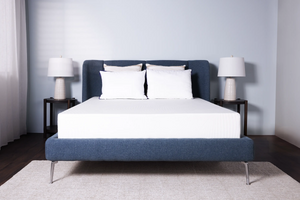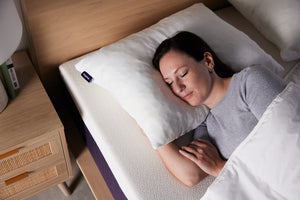It's normal to feel tired and sleepy at the end of a long day and alert in the morning, even if your alarm doesn't go off. This is how your body responds to the light and dark cycle controlled by an internal 24-hour biological clock located in the brain.
However, if you're having trouble sleeping or waking up, it's probably time to learn how to fix your sleep schedule.
When you finally fix your sleep schedule and invest in a good mattress, preferably a Polysleep mattress, you’ll begin to experience the benefits of quality sleep.
But even before you learn how to fix sleep schedule, let’s discuss the main cause of this problem.

Why Your Sleep Schedule Gets off Track
The light and day cycle, also called the circadian rhythm, works by picking signals from your environment and changes in your body. This rhythm controls your body's mental and physical functions.
For example, it coordinates how your digestive system produces some proteins just in time for your meals.
Similarly, the circadian rhythm signals the brain to increase the production of the sleep hormone called melatonin. This hormone is responsible for making you feel drowsy when darkness falls.

Its peak production time is usually during the wee hours of the night and subsides gradually towards the morning.
However, when the brain receives the wrong cue, it fails to increase melatonin production. For instance, studies show that the blue light, produced by electronic devices such as cell phones and TVs, suppresses melatonin production. This light stimulates the part of the brain that makes you feel alert.
Light is the most potent signal that influences how the circadian rhythm works. However, several other factors can reset your sleep schedule. They include:

- Changes in time zones
- Jet lag
- Shift-based work
- Irregular sleep and wake hours
- Delayed Sleep Phase Syndrome (DSPS)
- Blue light from electronic devices
- Gene mutation
- Caring for a newborn baby
- Body temperature
How to Get Your Sleep Schedule Back on Track?
Your sleep hygiene plays a huge role when planning how to reset your sleep schedule. Sleep hygiene combines healthy habits and environmental factors to form a routine to promote uninterrupted sleep.

How Long Does It Take to Fix Sleep Schedule?
If your circadian rhythm is severely misaligned, it may take you a couple of days or weeks to reset your sleep routine.

For instance, it takes longer to reset a sleep routine after several months or years of working a night shift job. However, it only takes a day per time zone to reset your sleep routine if you travel to a new location.
Some health conditions such as insomnia and DSPS affect the time required to reset a sleep schedule. If you suffer from a sleep condition that disrupts your sleep, consult a sleep specialist about creating an effective sleep plan.
How to Change Your Sleep Routine
Begin by setting a specific bedtime and wake-up time. Next, create healthy sleep hygiene and stick to it. For best results, be patient and consistent when adopting these changes.
12 Tips on How to Reset Your Sleep Schedule
Here are tips on how to reset your sleep schedule:
#1) Exercise But Not Too Close to Bedtime
Exercising improves how your internal 24-hour biological clock operates. It helps your muscles and tissues synchronize with the circadian rhythm. As a result, your body relaxes better and produces more melatonin to promote deep sleep.
You only need about 30 minutes of moderate exercise about five times a week. However, avoid exercising too close to bedtime as it may overstimulate your body, making it difficult to fall asleep.
#2) Relaxation Techniques Are Your Friend
Relaxation techniques relieve stress build-up, enabling you to sleep better. In addition, these techniques reduce the cortisol levels in your body, allowing you to relax and sleep better. Examples of relaxation exercises include yoga, meditation, stretches, and journaling.

#3) Get the Right Light in Your Bedroom
Create a sleeping ambiance in your bedroom by reducing excessive light during bedtime. Excessive lighting tricks the brain into believing it's daytime, slowing melatonin production. Also, avoid watching TV, scrolling through your phone, or using your laptop during bedtime to reduce exposure to blue light.

#4) Get Your Dose of Sunlight
Light is a significant component of the circadian rhythm. For this reason, adequate sunlight exposure helps reset a sleep schedule.
The sun emits blue light that suppresses melatonin production to keep you awake during the day. When the sun goes down, the brain signals the absence of blue light. As a result, it releases more melatonin, causing sleepiness.
#5) Don't Nap
Long daytime naps reduce your desire to fall asleep at night. Spend 30 minutes or less during naps if you must. In addition, avoid napping too close to bedtime or past 3 p.m.
#6) Keep a Noise-Free Environment Before Bed
Noise is a common cause of sleep distraction for many sleepers. Keep your phone, television, and other sounds away from your bedroom to prevent noise that could disrupt your sleep. You may also want to use white noise to improve your sleep quality if you live in a noisy environment.
If you're sharing a bed with your partner and have different sleep routines, you may want to invest in a noiseless mattress. The Polysleep Mattress made using motion-absorbing memory foam is an excellent choice.
#7) Build a Suitable Sleep Routine and Stick to It
Improve your sleep hygiene and stick to a sleep routine to reset your circadian rhythm. As a healthy adult, you need at least seven hours of sleep a day.
#8) Try Fasting
Since fasting affects metabolism, it influences the signals sent to your brain. For example, your brain signals your body to stay awake when eating and drinking. Conversely, your brain signals your body to prepare to rest when fasting and produces the sleep hormone to promote sleep.
#9) Eat Early and Avoid Certain Foods
Your body requires sufficient time to digest food before resting. Therefore, eating too close to bedtime can keep you awake longer than you should. In addition, some drinks such as coffee overstimulate the body, making it difficult to fall asleep.

#10) Melatonin Can Help You
If your sleep routine doesn't seem to work, your doctor may prescribe a dose of melatonin to supplement the natural melatonin in your body.

#11) Consult Your Doctor
If you still have difficulties falling asleep after learning how to fix sleep schedule, you should consult a doctor for a proper diagnosis. Some health conditions that cause sleep disruption include insomnia, stress, depression, and anxiety.
#12) Be Patient
It may be impractical to learn how to reset your sleep schedule in one day. This is because it takes patience and consistency for your body and brain to adjust to a new sleep routine or schedule.
Frequently Questions
Here are common questions people ask about how to reset sleep schedule:
Is It Possible to Fix Your Sleep Schedule in One Day?
If you've traveled to a new time zone, you may only need a day to reset your sleep schedule. However, it takes more than a day for your body to learn how to reset sleep schedule if your circadian rhythm is completely off track.
How Can You Stay Awake to Reset Sleep Schedule?
Learning how to reset sleep schedule to stay awake during the day takes practice. Here are some tips to keep you awake during the day.
- Avoid long naps.
- Have enough sunlight exposure.
- Keep yourself busy throughout the day.
- Take short breaks in between activities.
- Eat healthy.
Conclusion
Sleep is vital to your health and well-being. However, some lifestyle changes and health conditions can significantly change your bedtime and wake-up time.
If you're struggling with this problem, these tips on how to fix sleep schedule can help improve the quality of your sleep and life.
In addition, the quality of your mattress determines your comfort during sleep.
For example, if your allergies keep you awake all night, there'll be a significant change to your circadian rhythm.
In that case, the antimicrobial memory foam mattress from Polysleep is what you need to sleep better at night. This top-quality mattress protects you from allergens such as dust and germs, allowing you to sleep comfortably all night long.





























